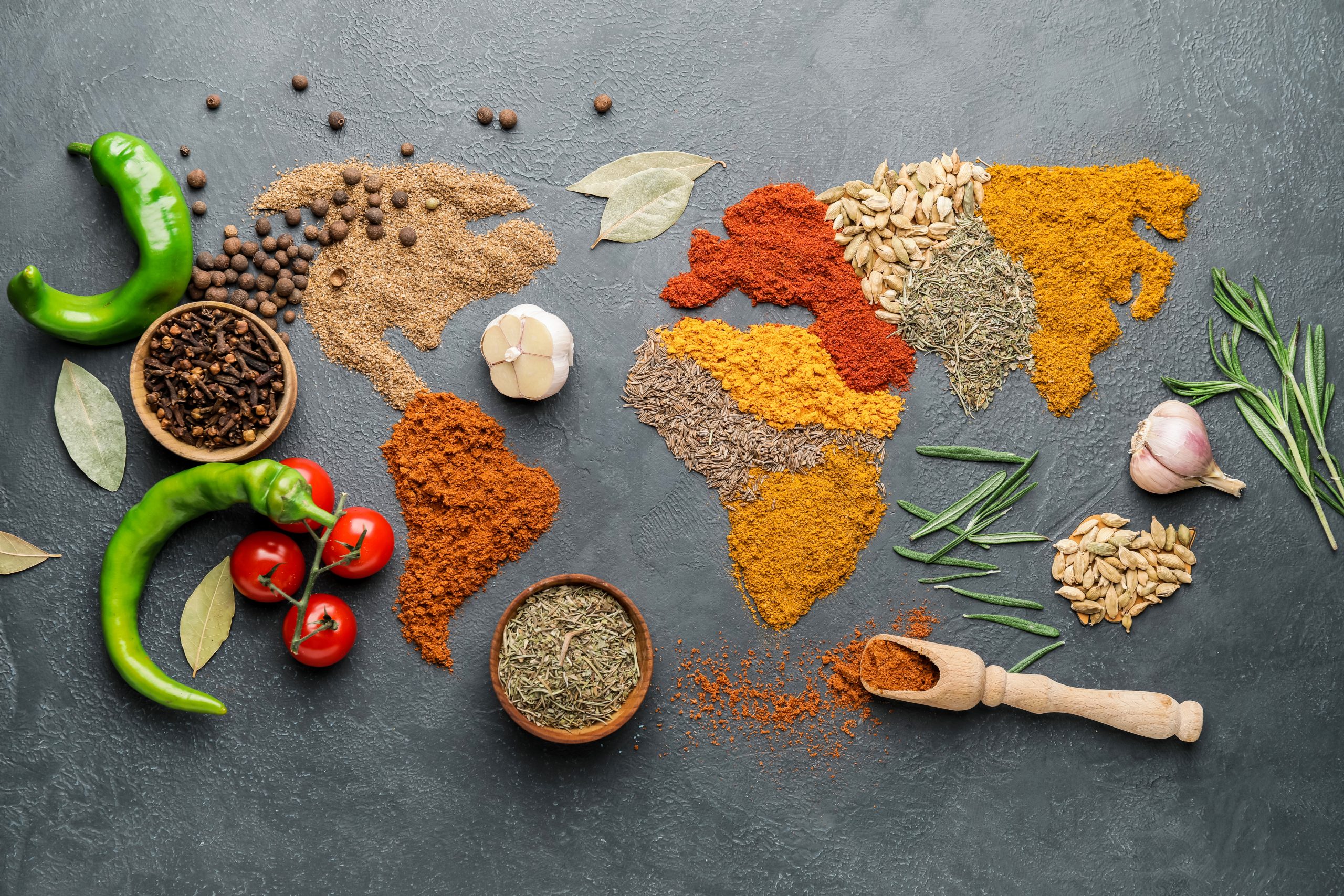What’s on the menu? Five food trend predictions for 2024
- Like
- Digg
- Del
- Tumblr
- VKontakte
- Buffer
- Love This
- Odnoklassniki
- Meneame
- Blogger
- Amazon
- Yahoo Mail
- Gmail
- AOL
- Newsvine
- HackerNews
- Evernote
- MySpace
- Mail.ru
- Viadeo
- Line
- Comments
- Yummly
- SMS
- Viber
- Telegram
- Subscribe
- Skype
- Facebook Messenger
- Kakao
- LiveJournal
- Yammer
- Edgar
- Fintel
- Mix
- Instapaper
- Copy Link
Posted: 10 January 2024 | Grace Galler | No comments yet
The food and beverage industry is evolving, but what trends will shape the sector in the next 12 months? Find out New Food’s trend predictions here…


It’s the start of a new year which, for New Food, means looking ahead to the next twelve months and predicting what trends will dominate the food and beverage industry in 2024.
This year, New Food’s Grace Galler has called on various members of the New Food Advisory Board who have been keeping their ear firmly to the ground in order to understand exactly how the food and beverage landscape will shape up in 12 months ahead.
There is no crystal ball to determine what the trends the food sector will be well accustomed to come December 2024, but there is research and experts in the field to help up better understand the evolving preferences, innovations, and societal shifts that will likely define the industry.
So what will be taken off the menu this year? And how might preferences be changing? Let’s investigate.
A gut feeling about probiotics
At the start of every year, many consumers turn their attention to health and nutrition. With Mintel predicting that “healthy ageing will be redefined by debunking ‘old’ stigmas and prioritising extending consumers’ healthy years”, what’s poised to experience a surge in interest throughout 2024?
Gut health had been a trending search on Google during 2023, with interest significantly rising in the last quarter of the year. Thanks to an increasingly informed consumer base prioritising wellness, there has already been a surge in products tailored to support digestive health.
Probiotics, prebiotics, and functional foods may well take centre stage in the months ahead, products that offer a diverse array of options aiming to balance and nourish the gut microbiome. From fermented foods like kimchi and kombucha to innovative probiotic-infused snacks and beverages, the evolving market reflects an interest in promoting gut well-being.
With research from the likes of the Global Prebiotic Association highlighting that “probiotics, prebiotics and polyphenols have been shown to benefit the microbiota and to reduce risk of CVD”, education surrounding this trend is plentiful and allows consumers to consider the potential link between gut health and overall wellness.
Sterling Crew, President of the Institute of Food Science and Technology (IFST) and New Food Advisory Board Member agrees that gut health is likely to take centre stage in 2024: “I have a gut feeling that we will see the emergence of the microbiome being a driver in new food development.
“In recent years it has become a key increasingly clear that a gut full of friendly microbes is vital for our good health. We are gathering greater knowledge about how our gut microbiome and food affects our mood and general health. Scientists are still learning about exactly how food influences us but it does seems like the gut microbiome plays a major part.”
“With products which have over five billion live cultures from 14 strains of bacteria. I believe this type of development will become new mega trend in the future.”
Tastes from around the world
Ingredients aren’t just components anymore. They are a gateway to exploring tastes from all four corners of the earth and, in 2024, its likely that consumers will continue to explore and embrace an eclectic array of international tastes and culinary traditions.
Seeking authenticity and adventure in their dining experiences, consumers are fostering a culinary revolution that not only celebrates global diversity but also encourages food and beverage creators to explore new frontiers in flavour profiles.
Uren Food Ingredients has forecasted that global cuisine will be a major influence throughout the upcoming year, with a specific focus on flavours and ingredients from Africa, South America and the Middle East.


Global cuisine will be a “major influence” in 2024, according to Uren Food Ingredients
“We expect consumer demand for adventurous global fusion cuisine to continue. Consumers are always on the lookout for unique and exotic flavours from different cultures, making it a great opportunity for chefs and food manufacturers to get creative with their menus,” Uren revealed in a report.
On this topic, Mecca Ibrahim, Co-Founder of Women in the Food Industry and New Food Advisory Board member shone a spotlight on Korean and South East Asian late-night foods, predicting that they will be “bigger than ever” this year.
“We have already seen the massive rise in food and experiences inspired by K-Pop and K-Dramas such as Squid Game. The West End is already showing signs of late-night food not being based around falling out of a night-club and then eating a kebab or KFC, but healthier trends of elaborate frozen desserts, teas and varieties of sweetcorn are taking hold.
“Flavours from Korea, Thailand, Vietnam, Southeast Asian, Japan and the Philippines show no sign of abating and I think that Korean Gochujang will become as ubiquitous as Sriracha was in its day and may even be seen in takeaways alongside brown sauce, mayo and vinegar.”
This year beckons food enterprises to not just tap into but embrace the flavours and authenticity of various cultures, perhaps redefining menus and product lines.
AI fuelled food safety
Artificial Intelligence (AI) has been a hot topic for a while now. Widely discussed at New Food’s Food Integrity Global conference, experts gathered to determine just how this powerful tool can be used to strengthen food safety. In fact, Crew told New Food that he believes it could “play a major role in helping to reduce world hunger”.
Shaping the future: Five takeaways from Food Integrity Global 2023
But how is it useful? The application of AI can be extended across the entire food supply chain, leveraging predictive analytics, machine learning, and real-time monitoring to enhance safety protocols. It can also be adopted by large and small scale manufacturing businesses to identify risks, facilitate swift intervention and prevent contamination or outbreaks.
When asked how he think AI could transform the sector in 2024, Crew shared: “I think that we are all still coming to terms with the potential impact of AI. I personally believe that we are going through the fourth industrial revolution. I believe it will enable us to deliver an even higher level of food safety.
“By using AI and optical imaging we could quickly and accurately identify pathogens in food, helping to prevent foodborne outbreaks and illnesses. AI will enable us to become more aware of food safety risks in our manufacturing environments and be able to pinpoint corrective actions. It will help us improve crop yields, quality, nutrition and traceability while decreasing resource consumption and hopefully help to eliminate food waste.”
However this emerging technology doesn’t come without its concerns, with Crew noting that it will “undoubtedly” replace a number of food sector technical jobs.
Less ultra-processed
Back in October 2022, the UK Government introduced a restriction on the promotion of high in fat, salt or sugar (HFSS) products, something that caused quite a stir in the sector.
Though the restriction of HFSS products by location came into force on 1 October 2022, restriction by volume price will be activated on 1 October 2025. But where does that leave us in 2024?
As part of its trends report, Mintel claimed that “clear communication will become necessary to help consumers make informed decisions about how processed and ultra-processed food and drink fit into their diets”. With this in mind, manufacturers and retailers appear to be actively reevaluating their product portfolios and marketing strategies, with an increased focus on reformulating existing products to reduce HFSS content.
In fact, CEO of Produced in Kent, Floortje Hoette, has noticed that there has been some “really innovative independent businesses using ingredients, where quality takes precedence and processing is considered to ensure maximum taste and minimum additives.”
Could the increasing awareness of the health implications associated with ultra-processed foods be driving a shift toward favouring whole, natural ingredients? Only the next 12 months will tell.
Localised food solutions
Though the Food and Drink Federation (FDF) reported that food exports during the first half of 2023 rose to almost £12 billion, at the end of last year, the World Bank observed that, as of December 11, 2023, 19 countries had implemented 27 food export bans.
With cases of extreme weather impacting farming across the globe, including the Indian rice shortage of 2023, the interconnectedness of global food trade has witnessed a shift and forced the sector to re-evaluate trade between countries.
Speaking on our “Food to Go” podcast, Professor Chris Elliott warned the industry that, due to the “ongoing impact of a climate crisis, we have to expect more and more food shortages.
“The fresh produce supply chains are already very stretched. We’ve had massive climate problems happening in different parts of the world where we source a lot of our food stuffs from. I think more empty supermarket shelfs for longer is my prediction for this year,” continued Elliott.
So how should the food and beverage sector respond to this concerning prediction? Well, according to Elliott, 2024 is a key year to consider deglobalisation “looking after your own population, and making sure they are fed properly”.
With the Environment Secretary, Steve Barclay, recently announcing plans to back British farmers by utilising “clearer labelling” for British food produce, including the use of a UK GI logo on food packaging, the urgency for consumers to support farmer’s close to home is evident.
The food sector is no stranger to adaptation. We witnessed first-hand just how agile it can be during difficult periods such as the COVID-19 pandemic. With climate change being a concern worldwide, the urgency for consumers to support farmers close to home becomes increasingly apparent, signalling a potential shift towards more in-country food consumption in 2024.
Biographies






Chris Elliott is currently Professor of Food Safety and founder of the Institute for Global Food Security at Queen’s University Belfast. He served as Pro Vice Chancellor responsible for the Medical and Life Sciences Faculty between 2015 and 2018
Related topics
Beverages, Food Safety, Food Security, Health & Nutrition, Ingredients, Quality analysis & quality control (QA/QC), Recruitment & workforce, Regulation & Legislation, Research & development, retail, The consumer, Trade & Economy, World Food
Related organisations
Global Prebiotic Association, Institute of Food Science and Technology (IFST), Mintel, Produced in Kent, The Women in the Food Industry, UK Government, Uren Food Ingredients
Related regions
Related people
Floortje Hoette, Mecca Ibrahim, Professor Chris Elliott, Sterling Crew









